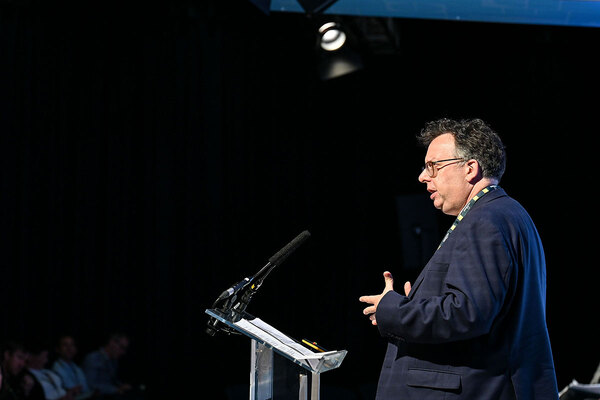You are viewing 1 of your 1 free articles
People power
Scottish tenants are being empowered to form ‘senates’ in order to scrutinise their landlords. Jill Stevenson finds out if they’re successful
Video:
features style

Scottish politics is incredibly high-profile at the moment. But if the scrutiny of Holyrood is intense, one Scottish landlord is looking to match it after setting up a parliamentary-style senate with its tenants.
The eight tenants on River Clyde Homes’ senate are few in number compared to Scotland’s parliamentarians. One is a former teacher, another a local lettings agent and a third a retired taxi driver. The youngest is 40 this year. But at this 8,500-home housing association, they hold plenty of power: a word from the senate, and things get done.
Staff members at River Clyde Homes are obliged to report on not just how the senate’s recommendations are going to be implemented, but when and by whom.
Video:
Ad slot
Giving more power to River Clyde tenants than ever before, the senate is part of a two-year-old Scottish government programme called Stepping up to Scrutiny.
“Members of the senate have a lot of clout in terms of not just making recommendations for improvements in the first place, but being able to actively check up to ensure they’re being carried out and by whom.”
Marion Wilson, 55, PE teacher and senate member
As well as River Clyde, this mechanism for getting tenants involved in decision-making is being piloted by Renfrewshire Council, 1,700-home Berwickshire Housing Association and 500-home Aberdeenshire and Moray Housing Partnerships. Each organisation is given funding of £3,350 to pay for a training course for tenants provided by the Chartered Institute of Housing (CIH), funding which it matches to help deliver the programme and train staff.
Executive powers
Formed in August 2014, the River Clyde senate abides by a code of practice. Its eight members applied for the position and were chosen via an independent panel interview (which included two representatives from TPAS).
Members can launch an investigation into an issue of their choosing. This involves questioning any member of staff at River Clyde Homes (from clerical to chief executive level) and visiting other housing associations to see examples of best practice. Already, the senate has talked to staff at the 2,454-home housing association Cube in Glasgow and the 6,500 home Link Housing in Dumbarton.
The tenants – and former tenants who’ve now purchased their former rented homes – are taught how to investigate though a training and learning programme run by the CIH, and following assessment, both staff and tenants gain a Level 3 award in resident scrutiny from the organisation. (This is not necessarily the case for other participants in the Stepping up to Scrutiny programme.)
As well as handing in two written assessments over a six-week period, candidates must also attend at least two half-day training sessions and complete a number of written exercises.
“There’s no room for someone who just wants to use the senate as a means of putting forward their own agenda.”
Sam Wilson, 63, River Clyde tenant and Senate member
The first major issue to come under the senate spotlight was the time taken to rent out void properties, after the senate decided that River Clyde’s rate of up to three months was too slow. They looked into reasons for the long delays and came up with a list of 12 recommendations – most of which will be implemented over the coming months. For example, the landlord will offer carpeting, decorating and, in some cases, furniture to make a hard-to-let home more attractive.
Other recommendations involve advertising social homes along the same lines as private homes; listing local amenities such as schools, play parks and coffee shops, as well as providing a 360-degree virtual video tour of homes to let on River Clyde’s website.
Private letting agent and senate member Joyce Stevens, 49, says: “It makes sense. I’d never dream of advertising a private home without listing all the advantages in terms of amenities. There shouldn’t be any difference when it comes to social housing. Whether you’re buying or renting your property, what’s available round about to amuse the kids and provide entertainment for the family as a whole is very important.”
Not all recommendations will be actioned, however.
For example, at the moment, tenants can only start a new tenancy on a Monday. The senate wants their landlord to change this, so tenancies can start on any day of the week. Sandra McLeod, director of housing at River Clyde, agrees this would be a good idea – but not for right now: “We are upgrading our IT system and it’s something we’ll look into at a later date.”
What’s in a name?
“We want to embed a culture of effective scrutiny in landlords’ practices across Scotland.”
Margaret Burgess, Scottish housing minister
The next item the senate is preparing to scrutinise is the allocation and fitting of aids and adaptations. The reason? One of the senate members’ friends had been getting some fitted and he wondered what the process was, and whether those who needed adaptations most were really getting a faster service.
On that note, wouldn’t ‘scrutiny panel’ have been a better name than the senate? “We thought scrutiny would have given housing staff the wrong idea with its negative connotations,” says Anne Ross, customer involvement officer at River Clyde Homes . “The mechanisms of the senate aren’t about cross-examining people and making sure they’re doing their job properly. Instead, it’s about getting the tenants and the staff to work together.”
Since ancient Rome, the term ‘senate’ has been used to describe assemblies of senior or experienced people tasked with giving legislation a “sober second thought”.
One of the members of the senate is former PE teacher Marion Wilson. Aged 55, Ms Wilson is a leaseholder whose home is ‘factored’, or managed by River Clyde. Even though she’s now purchased her home under the Right to Buy, she still qualifies as a ‘co-opted member’ of the senate.
“Once the senate was explained to me, I realised right away this was no going-round-in-circles talking shop,” she says. “Members of the senate have a lot of clout in terms of not just making recommendations for improvements in the first place, but being able to actively check up to ensure they’re being carried out and by whom. And if there’s something they don’t like or want explained, then it has to be done.”
Retired taxi driver Sam Wilson, 63, is a member of Broomhill Tenants and Residents Association and a tenant of River Clyde Homes. “What I like about the senate is that there are guidelines – a set of expected behaviours that we are governed by,” he says. “In other words, there’s no room for someone who just wants to use the senate as a means of putting forward their own agenda.”
One of those guidelines is that investigations have to be agreed by the majority.
Ms McLeod explains: “At first, staff were concerned at the idea of being interrogated, but they were given the questions beforehand and actually ended up enjoying the experience and interacting with tenants.
“Personally, I’m really impressed at how methodical the senate’s approach was.”
The Scottish Government is also impressed. Housing and welfare minister Margaret Burgess says: “We want to embed a culture of effective scrutiny in landlords’ practices across Scotland.
“The River Clyde Homes project is a great example of how tenants can work with social landlords to improve service and performance.”
River Clyde managers look forward to their meetings with the senate and tenants’ needs are being better represented. But there are other benefits too. “The fantastic feedback we get means we’re not having to pay for expensive market research,” adds Ms McLeod.
UPDATE: 12.08.2015, 11.10am
This article originally set out the costs of the programme for River Clyde as £3,000 per tenant, match funded by the Scottish Government, based on information provided by the Scottish Government press office. However, the actual match-funded cost per tenant is £3,350, and the article has been updated to reflect this.
The article originally stated that the senate received training from TPAS. When the project was first set up by River Clyde, training and assistance was provided by TPAS Scotland. However, shortly afterwards it became part of the Scottish Government’s Stepping up to Scrutiny programme, and training was thenceforth provided by CIH Scotland. The article has therefore been updated to reflect this fact.








